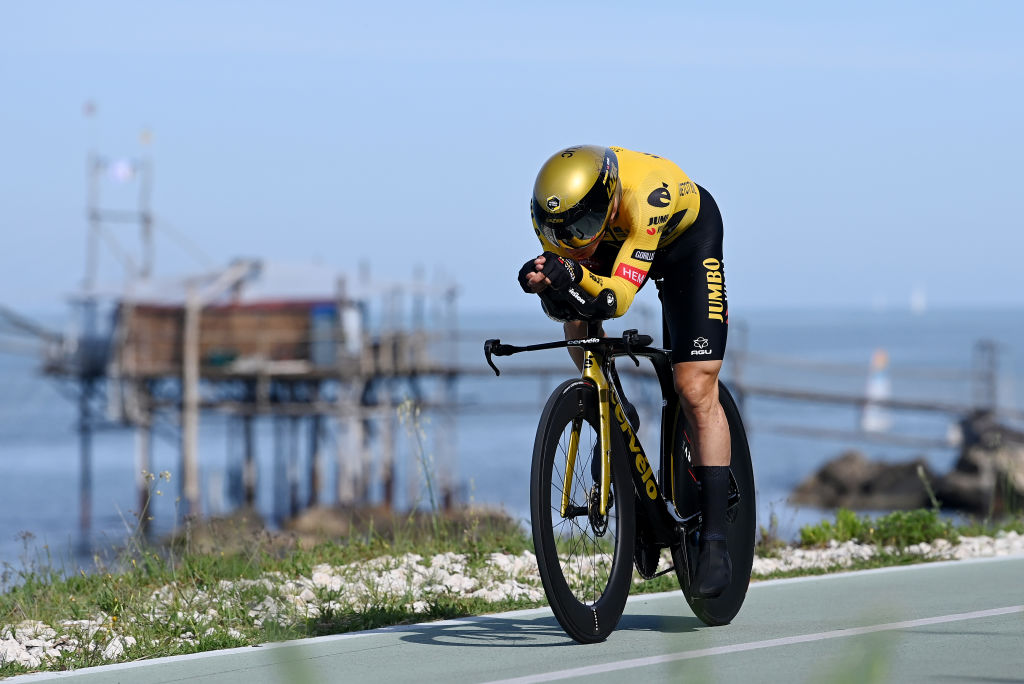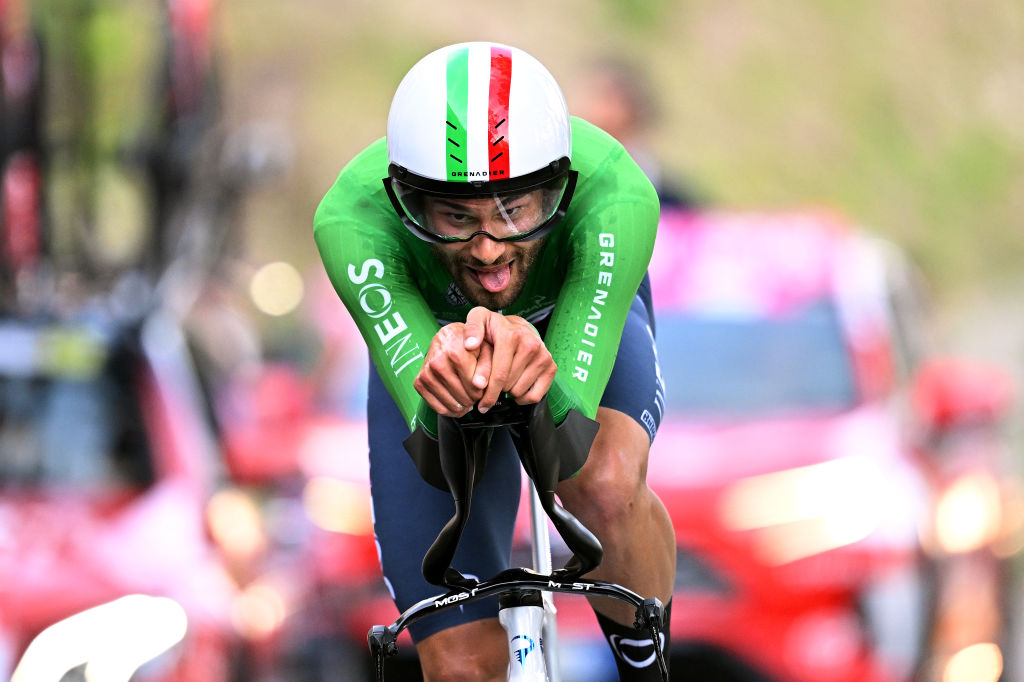‘Still 20 stages to go, eh?’ – Roglic dealt heavy blow by Evenepoel at Giro d’Italia
No answer from Slovenian or Ganna to world champion’s time trial exhibition

Primož Roglič rolled straight through the finish area on Ortona’s Via della Libertà without a second glance for the television crews trying to flag him down. He had just lost 46 seconds to Remco Evenepoel in the opening time trial of the Giro d’Italia. The clock had already said plenty. What more could he add?
Still, it would be remiss not to hear the thoughts of the joint-favourite for the Giro after a setback like this, and so a troupe of reporters set off jogging in pursuit of Roglič. Fortunately for them, the Slovenian’s knowledge of the back streets of Ortona was as ropey as theirs, and he had to stop by a crash barrier to seek directions to his team van from a Jumbo-Visma soigneur.
By the time Roglič had memorised the route – “Just before the roundabout, to the right for about 400 or 500 metres” – a forest of microphones had sprouted up all around him. He would doubtless have preferred to have slipped away without a word, but he’s been at this game long enough to realise throwing a bone here would probably prevent this same group from laying siege to his team van further down the road.
“Ah, it was hard, but now it’s behind, so I’m happy,” Roglič said with a gentle laugh when the first question was lobbed in his direction.
Giro d'Italia: Remco Evenepoel flies across time trial course for victory and first maglia rosa
Remco Evenepoel hits ground running at Giro d’Italia with knock-out stage 1 ITT victory
Primoz Roglic: COVID-19 positives at Giro d'Italia 'for sure not best thing'
Philippa York analysis: Weighing up Remco, Roglic and a Giro of fine margins
Another question about his sensations in this, his first race in over a month, was met with an equally amiable reply. “Oh, actually good,” he said. “I’m super happy. I’m optimistic for the upcoming days.”
And yet Roglič could only manage sixth on the stage, some 43 seconds down on Evenepoel, who was in a league entirely of his own on the Costa dei Trabocchi. At last year’s Vuelta, Roglič coughed up a similar deficit – 48 seconds – to Evenepoel in the time trial to Alicante, but that stage was rather longer, at 30.9km.
In other words, after beating Evenepoel in four of their first five time trial meetings over the years, Roglič has now lost the last two by increasing margins. After limiting his losses to 1.55 seconds per kilometre at last year’s Vuelta, Roglič conceded 2.19 seconds per kilometre here – a worrying trend with next weekend’s 35km test to Cesena in mind.
The latest race content, interviews, features, reviews and expert buying guides, direct to your inbox!
“Ha. I mean, it was for me just to do my best. I did and I’m happy about it,” Roglič said when asked about Evenepoel’s stratospheric performance here.
At the Volta a Catalunya last month, the pair were involved in a high-calibre duel where, in the absence of any time trials, Roglič’s superior acceleration in the dying metres of hilltop finales proved the tiebreaker. On Saturday’s evidence, Roglič will have to find altogether more adventurous ways of clawing back time from Evenepoel between now and Rome.
At least the terrain is still there to try. Roglič clung to that thought as he politely extricated himself from the loose media scrum: “And yeah, still 20 stages to go, eh?”
Ganna

Roglič wasn’t the only vanquished favourite struggling for words after Evenepoel’s supersonic display. Filippo Ganna (Ineos Grenadiers) came into this Giro with a 5-0 record in time trials at the corsa rosa, and he was widely tipped to claim the first pink jersey here, as he had done in Palermo in 2020 and in Turin a year later.
Ganna must have felt he had held up his end of the bargain by powering along the Ciclovia Adriatica at an average speed of 54.277 kph. The problem, however, was that Evenepoel had already scorched the earth along that same stretch of coastline, and Ganna was losing more than a second per kilometre even as he was issuing a sound beating to everybody else. The Italian would have to settle for second, some 22 seconds down.
For the first time at a Giro time trial, Ganna found himself warming down on a side street afterwards rather than behind the podium. As he pedalled slowly on his turbo trainer, tifosi began to huddle around, craning for a look at the Hour Record holder. A couple of shouts of ‘Grande Pippo!’ aside, the atmosphere was muted, with former national coach Davide Cassani, here in his role for RAI television, leading the sympathisers lining up by the Ineos van.
After finishing his warm down, Ganna agreed to speak to the assembled reporters. Like Roglič, he saw little reason to decorate the spare verdict of the results sheet with many words.
“I could see I was riding steady at 60 kph on my Garmin,” he said. “Maybe he was going at 65 kph.”
Ganna was already 12 seconds down at the first time check after 9.8km. He would lose another 3 seconds by the 16.8km mark, and then 7 more on the final haul to the finish in Ortona. His pacing strategy had been sound; Evenepoel had simply been on another level.
“I gave everything I had, I couldn’t have done any more than that,” Ganna said. “He was very strong.”
What more could he add?

Barry Ryan was Head of Features at Cyclingnews. He has covered professional cycling since 2010, reporting from the Tour de France, Giro d’Italia and events from Argentina to Japan. His writing has appeared in The Independent, Procycling and Cycling Plus. He is the author of The Ascent: Sean Kelly, Stephen Roche and the Rise of Irish Cycling’s Golden Generation, published by Gill Books.